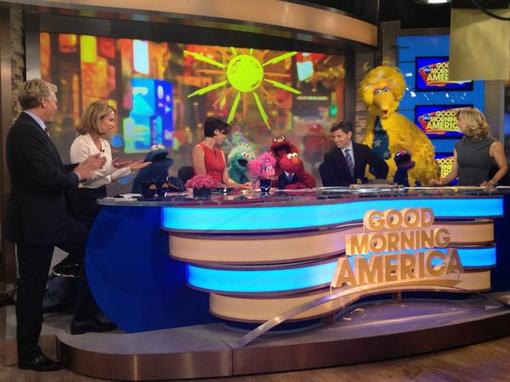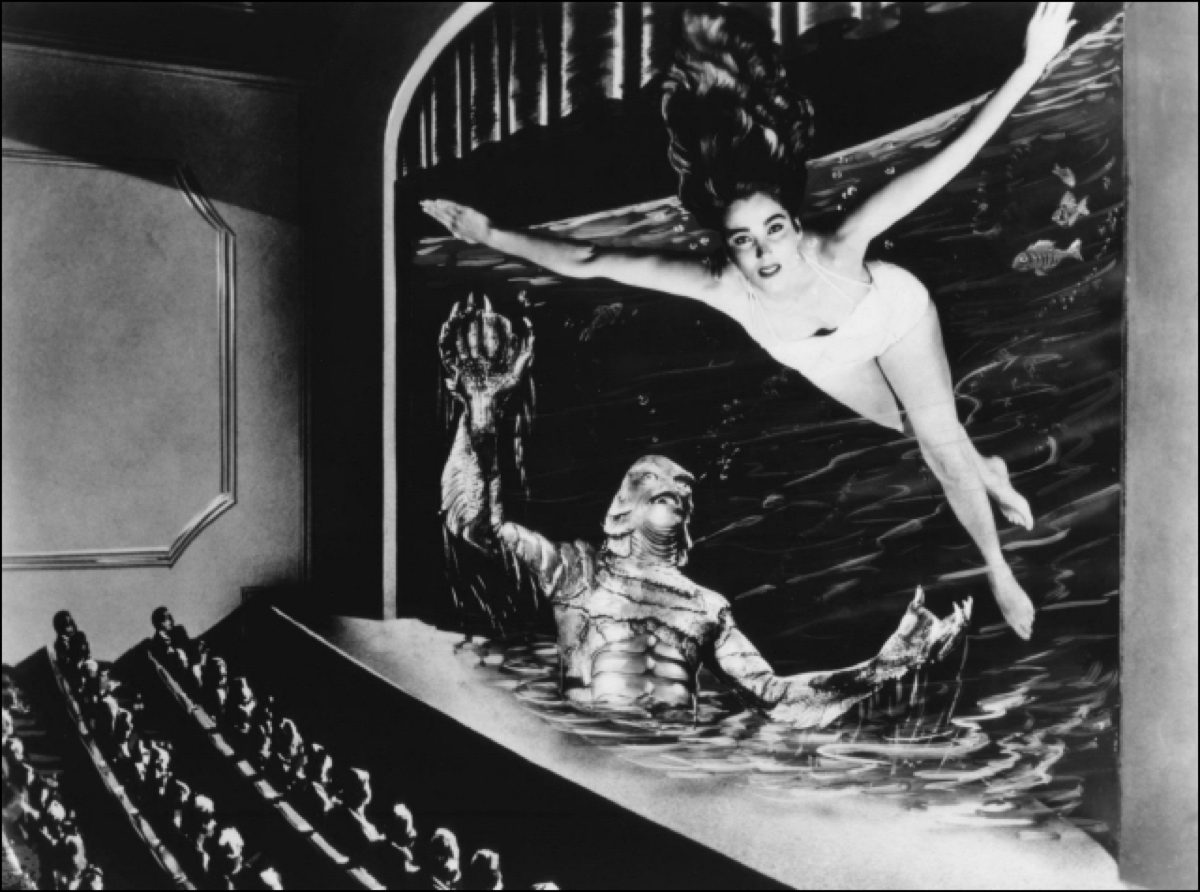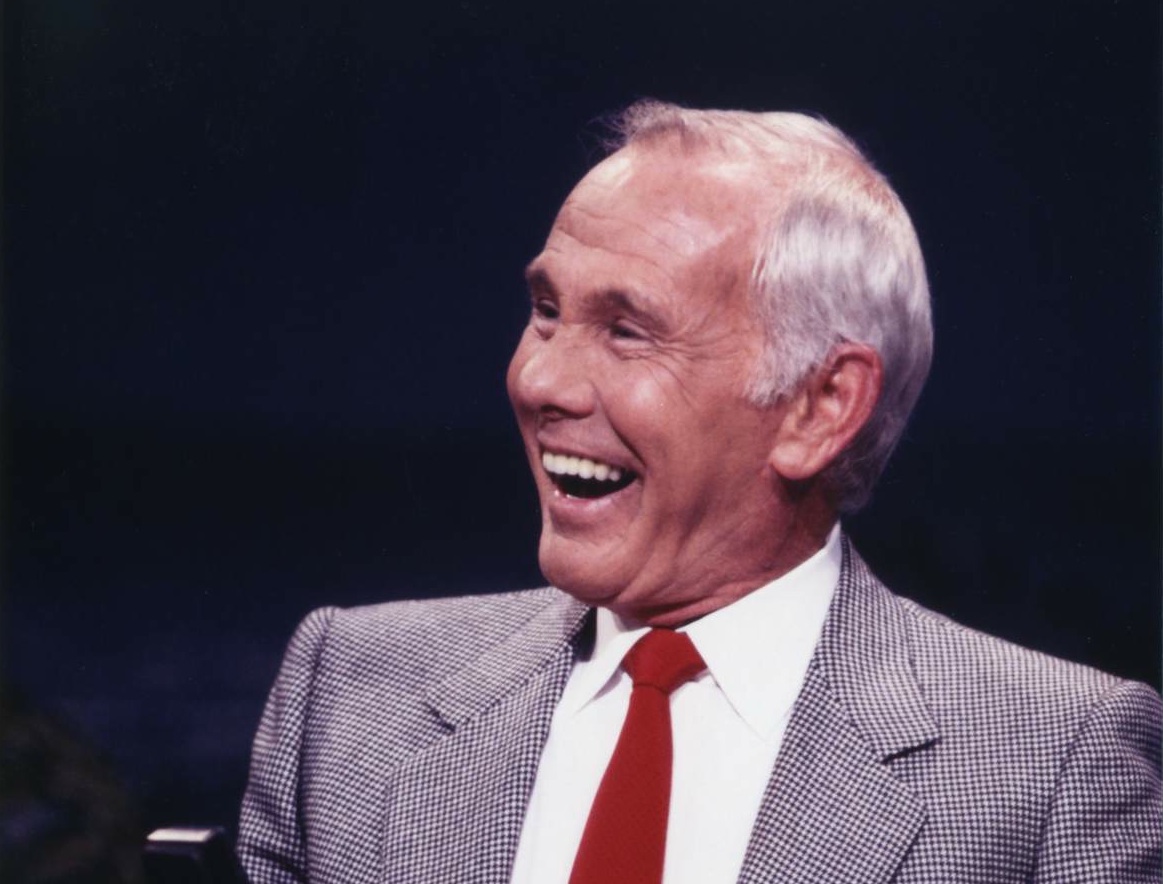And the Emmy for Best Family Comedy Goes to — “Good Morning, America”? Well, why not? ABC’s weekday 7 a.m. “news” program is about as newsy these days as “Here Comes Honey Boo Boo.” It’s also as warm, cuddly and cute as were “Ozzie and Harriet,” “The Smurfs,” “My Pink Pony” or the Muppets. In fact, the Muppets were busy overrunning the cast and set of “GMA” just the other day, although having them on hand only served to remind viewers that several of those in the “GMA” cast seem to have morphed into Muppets themselves.
When did it happen, this evolution of a respectable informational program into “Local Happy-Talk Goes National”? “Happy-Talk News” was a term coined decades ago for local newscasts transformed by highly paid consulting firms into sweet and jolly get-togethers for artificial extended families who performed on the air as if they were all locked in states of permanent aggregate admiration. Weathermen had to be funny uncles, sportscasters had to be wacky brothers-(or sisters-) in-law, the anchor team were proud parents who exchanged occasional good-natured jibes, and friendly neighbors (once correspondents) dropped in with chummy items, tales of heartwarming uplift, and the occasional morsel of news.
“GMA” is a lot like that now, but with lurid messy murder and child-abduction stories supplementing all the frothier stuff. Personable George Stephanopoulos wrestled with his conscience in 2009 when offered the gig as cohost — a far less dignified role than he’d enjoyed in such TV work as anchoring the Sunday morning “This Week” show, originally a vehicle for the great David Brinkley — and guess what: his conscience lost. It’s hard for a conscience to out-shout a reputed $10 million annual paycheck and all that household-name exposure. Stephanopoulos told himself what many other respectable journalists had told themselves for years; he would dignify the job rather than let the job de-dignify him.
He seemed to be winning, too, except that as the content got cuter and cuter, the contributors were called upon to be increasingly adorable and telegenic. Soon they were all as buddy-buddy as Sgt. Pepper’s Lonely Hearts Club Band. They joked, they joshed, they chortled and chuckled, and the show’s “news hole” shrank as if treated with Preparation H (sorry about that) while show-biz gossip and Eurotrash titillators took up the slack. Now, once those pesky and potentially depressing headlines are out of the way, the show settles daily into a smiley imitation of “Entertainment Tonight” but arguably with less dignity. It could almost be any of those tabloid series defined by the fact that they report on the Kardashians with straight faces and have treated Tom Cruise’s marital mess as the Story of the Century, so far.
Cornered and trapped, Stephanopoulos has opted for lovable over respected (though, brought in to rescue “This Week” after Christiane Amanpour nearly ruined it, he’s still Dr. Jekyll on Sunday mornings). Robin Roberts, one of the most popular personalities in the history of ESPN, ABC’s conjoined twin, didn’t have to learn to be the Viewer’s Friend when transferred to GMA because she’d had years of practice and proficiency. Weatherman Sam Champion is called upon to be jollier than Santa Claus; in addition to the weather, Good Neighbor Sam has participated in such huggable features as “Be Inspired,” wherein cast members talked about people who had urged them on to greatness over the years. Sam paid tribute to his sister.
The show became a daily indoor picnic, albeit one without food in wicker baskets; they all loved each other so much, and still do. Although network television has declined in most ways over the years, its utility shows — early morning and late-night fare, for instance — remain popular profit centers, and competition remains fierce. Bad taste is not its own reward; ratings are. In recent weeks, “GMA” has inched closer and closer to its goal of goals, consistently beating the “Today” show — the original morning infotainment staple invented in the 1950’s by programming genius Sylvester “Pat” Weaver — in the Nielsen ratings.
“GMA” is an imitation of “Today,” of course. And the sincerest form of flattery doesn’t end there. When former “Today” executive producer Steve Friedman decided to take the show back to its roots with big windows looking out on New Yorkers and tourists who passed by — or stood there waving — “GMA” took to street-level Times Square, where its studios are. When “Today” decided to devote a half-hour each Friday to a rock or pop concert, “GMA” unashamedly followed suit. “Today” remains the innovator more often than the imitator.
Each encroachment on “Today’s” once dominant ratings was joyfully noted in an ABC press release, like this one dated Sept. 13: “For the 2nd Consecutive Week, ‘GMA’ Posts Historic Total Viewer and A25-54 Margins Over ‘Today,'” a feat broken down by sub-heads: “‘GMA on Top in 9 of Last 11 Weeks” and “‘GMA Grows Year-to-Year Among Total Viewers and A25-54, While ‘Today’ Declines Double-Digits.” Adults 25-to-54 are the prime target demographic for news programming, the category in which “GMA” is still listed — perhaps a technicality.
CBS has opted out of the fray by returning its “Morning News” program to its roots — not fun features or Hollywood tattling or home remedies and recipes, though those may still appear, but with the decided emphasis on actual news and not just during the first half-hour, either. So “GMA” and “Today” slug it out for top ratings and revenues, and obviously the scary thing is that if “GMA” continues to triumph with foolishness, “Today” may have to swallow a peacock and amp up its own heartworm. I mean, heartwarmth.

Now we come to Something That Must Be Said. It may have been said elsewhere already, but just in case, here goes: ABC has managed to turn the very serious illness of co-anchor Roberts into a huge promotional opportunity for “GMA.” Roberts has taken a sabbatical to undergo treatment — including a bone marrow transplant and chemotherapy — for MDS, a devastating blood disorder once known as preleukemia. On every edition of “GMA,” there are shout-outs, warm wishes and detailed reports pertaining to Roberts’ condition. She has been seen in remotes from the hospital, and the sympathetic outpourings of viewers have been heavily documented. Most of the first half-hour of Thursday’s (Sept. 20) show was a report on Roberts’ transplant.
Roberts was seen in a recorded message thanking viewers: “I feel the love and I thank you for it.” ABC rushed out a press release, this one headlined “Robin Roberts’ Message: I Feel the Love and I Thank You For It” and including a disclaimer: “News organizations using material from this report should credit ‘Good Morning, America.’ ”
We all wish Robin Roberts well. And we hope she is not being charged with sick days, considering the fact that her illness has practically become another character in the show’s cast.
“Today,” meanwhile, has had other problems. While new cohost Savannah Guthrie has proven a considerable asset, and is emerging as one of the best interviewers in network news, her predecessor, the rather weepy Ann Curry, never clicked, and her mawkish on-air farewell to the show (especially gratuitous since other high-paying work had been found to keep her employed at NBC) was a major embarrassment, probably the biggest of the summer until Clint Eastwood’s chat with a chair. Still, “Today’s” worst woe right now remains the aggressive “GMA” assault. Emboldened by sporadic success, “GMA” could become even more lightheaded and less news-oriented and more like an informational sitcom. And then what will “Today,” still serious by comparison, do to counter the attack? Try to locate the grandchildren of J. Fred Muggs?
Given the success they’ve had with hokey real-life melodrama, I’m kinda surprised the folks at “GMA” didn’t latch onto the Curry mess and turn it into a series of features. Embarrassing, lachrymose, corny? You bet! After all, if there’s no crying in baseball, there’s also no blushing in network television.












